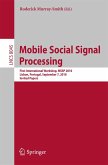Chapters are consistently structured to describe the research methods and their applications, including what they are useful for, what they are not appropriate for, and the key ingredients needed before using a method. Each chapter provides:
· A short description of the method
· Its history and evolution
· The questions it can answer
· Guidelines to ensure quality work
· References for increasing expertise
· References to examples of successful application
· Exercises suitable for further student exploration
The chapters, written by foremost experts in the field, are highly diverse. They range from grounded theory and action research to retrospective analysis, agent-based modeling, and social network analysis. Several chapters focus on system building, such as technical research, building an experimental online community, and field deployments, while others focus on design research. Experiments and surveys are covered, including their potential to benefit from crowdsourcing. New sources of digital data sensory systems, eye tracking, and log analysis are discussed. Because many of these methods extend to the world of online activity, the book concludes by exploring the ethical challenges that have surfaced.
Ways of Knowing in HCI provides a starting point toward other avenues for continued learning. Readers will gain an understanding of the type of knowledge each method provides, its disciplinary roots, and how each contributes to understanding users, user behavior, and the context of use. The book is an invaluable resource for students, researchers and professionals alike.
Dieser Download kann aus rechtlichen Gründen nur mit Rechnungsadresse in A, B, BG, CY, CZ, D, DK, EW, E, FIN, F, GR, HR, H, IRL, I, LT, L, LR, M, NL, PL, P, R, S, SLO, SK ausgeliefert werden.









